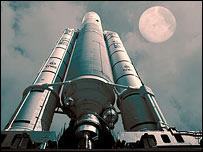Difficult European space program
 Ministers from 17 European countries will meet again on Monday in Berlin to discuss the future of Europe's space program. They will decide whether to conduct a series of space expeditions proposed for the next decade.
Ministers from 17 European countries will meet again on Monday in Berlin to discuss the future of Europe's space program. They will decide whether to conduct a series of space expeditions proposed for the next decade.
The exploration of Mars robot, replacing the lost Cryosat and the earth observation satellite network, is also competing for the budget.
Negotiations are considered very important for Europe's space industry in the context of shrinking commercial markets.
During this annual meeting, the European Space Commission will require 18 member countries (17 of Europe and Canada) to contribute 8.8 billion euros for mandatory and planned programs.
This amount includes 3.1 billion euros to carry out the compulsory science program until 2010 and 5.7 billion later to implement scheduled programs and start new expeditions.
Although the market for space operations has shrunk in recent years, public costs for space have increased.
This makes the implementation of decisions at the European Space Commission more and more important because most of the funds approved at the meeting will be spent on European space technology.
Member states have been determining investment priorities ahead of the Berlin summit.
Observers say it seems that all programs will find adequate funding, which makes the negotiation negotiations in and outside the meeting room even more stressful.
It is expected that the schools will give the green light for the future of Cryosat funding, which, in the opinion of the scientific community, is a key means of monitoring the earth's climate change
- NASA and ESA test the Earth protection program
- Russia headache with space program
- ESA announced the mission to conquer new space
- Russia invites countries to participate in the moon exploration program
- Poland is a member of the European space agency
- European aviation agency launched Mercury exploration program
- Russia revealed the space program by 2020
- European Space Agency recruits future astronauts
- European spacecraft connects itself with ISS
- Mars used to have an ocean
- Russia participates in the search for life on Jupiter's satellite
- The most expensive cosmic projects on the planet
 Vietnam 5th Asian champion on fuel-efficient vehicles
Vietnam 5th Asian champion on fuel-efficient vehicles We can read all NASA studies completely free of charge
We can read all NASA studies completely free of charge Singer and songwriter Bob Dylan won the 2016 Nobel Prize for Literature
Singer and songwriter Bob Dylan won the 2016 Nobel Prize for Literature Scientific revolution in Asia
Scientific revolution in Asia The Heartbreaking Truth Behind the Astronaut Job That Many People Dream of
The Heartbreaking Truth Behind the Astronaut Job That Many People Dream of  'Strange smell' detected on cargo spacecraft to ISS
'Strange smell' detected on cargo spacecraft to ISS  After 4 years of being sent into space by Elon Musk, what is the fate of the $100,000 Tesla Roadster now?
After 4 years of being sent into space by Elon Musk, what is the fate of the $100,000 Tesla Roadster now?  The Shape of the Universe Isn't What You Think: From Ancient Round Sky to Modern Three-Dimensional Donut
The Shape of the Universe Isn't What You Think: From Ancient Round Sky to Modern Three-Dimensional Donut  How to get back to the spacecraft if the astronauts leave the cabin to work and accidentally drift away?
How to get back to the spacecraft if the astronauts leave the cabin to work and accidentally drift away?  Announcement of discovery of micro-asteroid population in the Solar System
Announcement of discovery of micro-asteroid population in the Solar System 